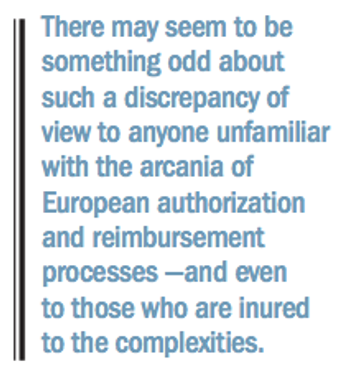
Of the 28 European Union member states, nine did not make an offer to host the European Medicines Agency (EMA) by the July 31 deadline-and one of them is very sorely missed, writes Peter O'Donnell.

Of the 28 European Union member states, nine did not make an offer to host the European Medicines Agency (EMA) by the July 31 deadline-and one of them is very sorely missed, writes Peter O'Donnell.

The European Health Data Network (EHDN) initiative kicks off-a challenging and resource-intensive effort designed to harmonize data analysis and conversion amid the push toward outcomes-focused healthcare in Europe.

Peter O'Donnell discusses the interest expressed by members states to host the EMA.

Several projects in works illustrate the importance of those unsung heroes in Europe's R&D engine room.

Nearly every EU member country has put in a bid to host the EMA once the UK leaves the European Union in 2019. The conditions and criteria for doing so are now becoming clear.

As negotiations between the UK and the remaining 27 members of the European Union commence in the next month or so, questions of trade, IP protection and of free movement will emerge.

Wherever the EMA winds up after Brexit, the reality for anyone working on drug development is that the strains and constraints of their job are not going to get any easier.

Is the much anticipated Europe action plan on personalized medicines, unveiled recently by an EU-sponsored international consortium, worth paying a close eye on?

Europe is issuing a significant update to its ethical guidelines governing health-related research involving humans.

With bidding starting to intensify among member states, several factors will determine the EMA’s next home.

The European Medicines Agency’s new website of detailed information on products it has assessed has been launched. Thus begins a new era of open access data for European pharma industry professionals.

The European Medicines Agency has started to deliver on its promise of open access to clinical reports for new medicines authorized in the European Union. Peter O’Donnell reports on his experience accessing this database.

New actions underway seek to find a consensus on the role of HTAs in the decision-making chain, including with clinical trials.

With registries gaining steam as a potential European policy agenda, the EMA plans to incorporate them into the healthcare community. This movement aims to solve the issues of getting the right drugs to the right patients at the right time, and at something like the right cost.

A look at the EMA’s proposed guidance revisions for first-in-human studies.

While Europe is feeling the effects of the recent UK Brexit vote, the European Medicines Agency is continuing onward with business as usual despite questions over its location and the future of its employees.

European consumers are concerned that faster drug development processes being pushed by regulators can be unsafe for patients. With the EMA spearheading discussion on medicines adaptive pathways to patients, or MAPPs, more convincing is needed.

Renewed attention on ways to tackle this age-old scourge is building in Europe and beyond.

Peter O'Donnell writes that the EMA surprisingly diverted from it's usually strict boundaries on it's annual report published in May.

New policy hopes to calm the fervor around clinical trial data disclosure and confidentiality issues.

Hans-Georg Eichler, the Senior Medical Officer at the European Medicines Agency, addresses adaptive pathways as a way to "ensure sustainability of the innovation system and the healthcare systems."

This week, The Netherlands, which is in charge of EU business for the first six months of this year, has convoked an intensive round of meetings to show that it really is taking health policy seriously during its turn in the rotating EU presidency.

European health officials and patient advocates speak bluntly on the treatment access dilemmas for patients with rare diseases-and point to opportunities in translational research and joint negotiations with manufacturers as possible solutions to close gap.

Incoherencies in Europe’s drug-access arrangements raise questions, debate.

Although only the beginning of an exploratory process, the EMA is being accused of colluding in a conspiracy to favor drug firms at the expense of patient protection.